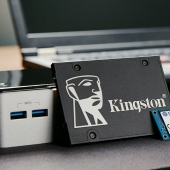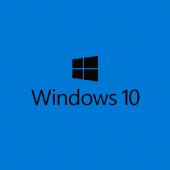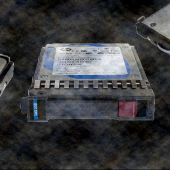-
Enjoy quick, compatible data transfers with this $59.99 portable SSD
Get the Polar Wolf Aluminum Ultra Portable External SSD now for up to 44% off the MSRP. Choose from 256GB for $43.99 (reg. $75), 512GB for $59.99 (reg. $107) or 1TB for $96.99 (reg. $139).
- March 05, 2024
- 07:18 AM
 0
0
-
Kingston's SSD firmware has Coldplay lyrics hidden within it
What has firmware got to do with pop rock, you ask? That's the question that crossed a security researcher's mind as he analyzed Kingston's firmware and stumbled upon the lyrics of a popular Coldplay song buried deep within it.
- May 10, 2023
- 10:13 AM
 2
2
-
Firmware attack can drop persistent malware in hidden SSD area
Korean researchers have developed a set of attacks against some solid-state drives (SSDs) that could allow planting malware in a location that's beyond the reach of the user and security solutions.
- December 30, 2021
- 09:55 AM
 0
0
-
Western Digital confirms speed crippling SN550 SSD flash change
Western Digital has confirmed that it changed the NAND flash memory in one of its most popular M.2 NVMe SSD models, the WD Blue SN550, which crippled writing speeds according to several reports, leading to a 50% performance hit.
- August 26, 2021
- 01:17 PM
 1
1
-
Microsoft fixes Windows 10 BSOD crashes caused by NVMe SSDs
Microsoft has fixed a known issue causing Windows 10 blue screens of death (BSOD) crashes when users plugged in a Thunderbolt NVMe (Non-Volatile Memory Express) Solid State Drive (SSD).
- December 01, 2020
- 10:04 AM
 0
0
-
Windows 10 Defrag TRIM bug still not fixed after six months
After the release of two Windows 10 feature updates and numerous cumulative updates, Microsoft has still not fixed a bug causing Windows Defrag to TRIM non-SSD drives.
- November 21, 2020
- 01:11 PM
 8
8
-
Microsoft investigating Windows 10 crashes caused by NVMe SSDs
Microsoft says that devices running Windows 10 2004 or Windows 10 20H2 might crash with blue screens of death (BSODs) when users plug in a Thunderbolt NVMe (Non-Volatile Memory Express) Solid State Drive (SSD).
- November 06, 2020
- 10:19 AM
 0
0
-
Microsoft adds Windows 10 storage health monitoring for NVMe SSDs
Starting with the latest Windows 10 build, the OS will alert users of any hardware issues affecting their NVMe (Non-Volatile Memory Express) Solid State Drives (SSDs) that could potentially lead to a risk of failure.
- September 30, 2020
- 01:07 PM
 1
1
-
Microsoft fixes Windows 10 bug causing excessive SSD defragging
Microsoft has fixed a bug in the Windows 10 version 2004 defragger that caused SSD drives to be defragmented too often.
- September 08, 2020
- 07:45 AM
 2
2
-
Microsoft tests fix for bug that defrags SSD drives too often
For the testers in the Beta Channel (Slow Ring) of the Windows Insider Program, Windows 10 Build 19042.487 (20H2) is now available with a long list of bug fixes and improvements.
- August 26, 2020
- 04:03 PM
 32
32
-
Windows 10 Alert: Defragger bug defrags SSD Drives too often
With the release of Windows 10 version 2004, the Windows Defragger has become a mess as it starts to defrag SSD drives too often, perform trim on non-SSD drives, and forgets when it last optimized a drive.
- June 14, 2020
- 12:15 PM
 17
17
-
HPE Warns of New Bug That Kills SSD Drives After 40,000 Hours
Hewlett Packard Enterprise (HPE) is once again warning its customers that certain Serial-Attached SCSI solid-state drives will fail after 40,000 hours of operation, unless a critical patch is applied.
- March 24, 2020
- 06:26 PM
 4
4
-
HP Warns That Some SSD Drives Will Fail at 32,768 Hours of Use
HP released firmware updates for a number of its Serial-Attached SCSI solid-state drives to prevent their failure at exactly 32,768 hours of operation time.
- November 26, 2019
- 06:23 PM
 7
7
-
Flaws in Popular SSD Drives Bypass Hardware Disk Encryption
Researchers have found flaws that can be exploited to bypass hardware decryption without a password in well known and popular SSD drives.
- November 05, 2018
- 01:56 PM
 9
9
-
Microsoft Releases KB4100403 to Fix Windows 10 Intel & Toshiba SSD Issues
Earlier today, Microsoft released cumulative update KB4100403 that fixes several bugs, including the issues some users reported with Intel and Toshiba solid-state drives (SSDs).
- May 24, 2018
- 02:13 PM
 6
6
-
Rollout of Windows 10 April Update Halted for Devices With Intel & Toshiba SSDs
Microsoft has halted the deployment of the Windows 10 April 2018 Update for computers using certain types of Intel and Toshiba solid state drives (SSDs).
- May 16, 2018
- 02:00 PM
 3
3
-
SSD Drives Vulnerable to Attacks That Corrupt User Data
NAND flash memory chips, the building blocks of solid-state drives (SSDs), include what could be called "programming vulnerabilities" that can be exploited to alter stored data or shorten the SSD's lifespan.
- May 21, 2017
- 07:35 AM
 0
0






















